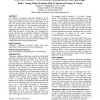1234 search results - page 19 / 247 » Ubiquitous Knowledge Discovery |
SWWS
2007
13 years 11 months ago
2007
−The ability for software agents to discover, query, and task ubiquitous sensors requires machineinterpretable service descriptions, such as those proposed by the Semantic Web ef...
MOBIQUITOUS
2008
IEEE
14 years 4 months ago
2008
IEEE
The big challenge related to the contemporary research on ubiquitous and pervasive computing is that of seamless integration. For the next generation of ubiquitous and distributed...
CHI
2004
ACM
14 years 3 months ago
2004
ACM
As ubiquitous computing technology migrates into the home environment, there has been a concurrent effort to allow users to build and customize such technologies to suit their own...
SKG
2006
IEEE
14 years 4 months ago
2006
IEEE
This article explores the utility of neural network ensembles in knowledge discovery and integration. A novel neural network ensemble model KBNNE (Knowledge-Based Neural Network E...
HICSS
2003
IEEE
14 years 3 months ago
2003
IEEE
Inductive representation of conditional knowledge means to complete knowledge appropriately and can be looked upon as an instance of quite a general representation problem. The cr...

